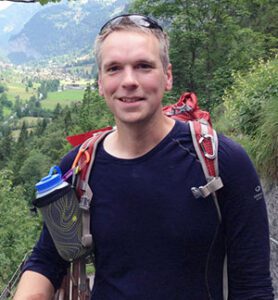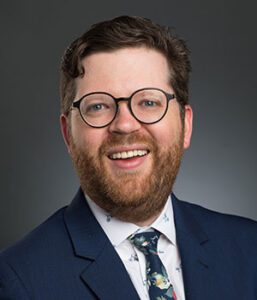The UW Department of Bioengineering is excited to announce that faculty members Andre Berndt and Patrick Boyle have been promoted.
Andre Berndt
 Recently promoted from assistant professor to associate professor with tenure, Andre Berndt’s fascination with the natural world and the mysteries of the universe began in childhood. Inspired by scientific luminaries such as Einstein, Max Planck and Stephen Hawking, he devoured books on space, geology, animals and physics.
Recently promoted from assistant professor to associate professor with tenure, Andre Berndt’s fascination with the natural world and the mysteries of the universe began in childhood. Inspired by scientific luminaries such as Einstein, Max Planck and Stephen Hawking, he devoured books on space, geology, animals and physics.
Berndt pursued his academic interests in both biology and physics at university but soon realized that biophysics, which combines elements of both disciplines, was his true calling. His undergraduate and graduate studies in biophysics set the stage for his future contributions to the emerging field of optogenetics. Optogenetics, which uses light to control cells within living tissue, particularly neurons, was gaining traction when Berndt joined a new lab at Humboldt University in Berlin.
During his tenure at the lab, Berndt’s pioneering work on the first applications of optogenetics, particularly focusing on ion channels as tools for neuroscience, was truly groundbreaking. His collaborations with leading scientists at Stanford University resulted in the co-publication of influential papers, further solidifying his reputation as a respected researcher in the field.
Berndt’s decision to join UW Bioengineering was driven by his desire to explore new research avenues and leverage the institution’s robust interdisciplinary environment. At UW, he aimed to develop fluorescent sensors for optogenetics to detect neural signals, a new direction that required collaboration with neuroscientists and genome scientists. The UW Departments of Genome Sciences, Anesthesiology, and Pharmacology offered the perfect partners for Berndt to pursue his innovative research.
At UW, Berndt’s involvement with the Institute for Stem Cell and Regenerative Medicine (ISCRM) and his focus on stem cell optogenetics is a testament to the collaborative and open-minded culture at UW. Here, researchers are genuinely excited about each other’s work, often bringing together diverse research trajectories to create innovative projects, a perfect environment for Berndt’s innovative research.
The Berndt lab is at the forefront of engineering fluorescent proteins that can visualize signaling molecules in real time. Using fluorescent microscopes, researchers can target and follow specific molecules, helping them visualize cellular dynamics and understand how cells communicate and interact. While their current focus is primarily on neurons and neuronal networks, Berndt hopes to expand applications into other cell types in the future. The lab is also working to incorporate machine learning to better understand patterns and correlations in data, enhancing research efficiency.
Described by his students and trainees as supportive, Berndt takes great inspiration from his own mentors and strives to provide a framework for his students while giving them the freedom to pursue their interests independently. He focuses on equipping them with the necessary tools, resources and knowledge, avoiding micromanagement and fostering a collaborative environment where they can innovate.
Among his many achievements, Berndt was honored with the 2022 McKnight Technological Innovations in Neuroscience Award. He also received the Bioengineering Departmental Research Award in both 2023 and 2024, recognizing his significant scholarly output and ongoing contributions to the field.
Patrick Boyle
 Patrick “Pat” Boyle has been promoted from assistant professor to associate professor with tenure, and his journey into the world of bioengineering is a testament to the power of curiosity and interdisciplinary collaboration. Originally from Alberta, Canada, Boyle began his academic career at the University of Calgary, initially aiming for a pre-med track. Instead, he discovered a passion for engineering through his interactions with friends and mentors. This led him to switch gears, immersing himself in computer engineering courses.
Patrick “Pat” Boyle has been promoted from assistant professor to associate professor with tenure, and his journey into the world of bioengineering is a testament to the power of curiosity and interdisciplinary collaboration. Originally from Alberta, Canada, Boyle began his academic career at the University of Calgary, initially aiming for a pre-med track. Instead, he discovered a passion for engineering through his interactions with friends and mentors. This led him to switch gears, immersing himself in computer engineering courses.
During his senior year as an undergrad, Boyle’s interest in medicine was rekindled, but this time with a technological twist. A pivotal course on biomedical signal analysis introduced him to the world of signal sensors and computational modeling. Despite still considering medical school at the start of his graduate studies, Boyle quickly realized that the hands-on aspects of medicine did not appeal to him. Instead, he found his niche in bioengineering, where he could merge his engineering skills with medical applications.
After completing a postdoctoral fellowship and continuing his journey into academia at Johns Hopkins University, Boyle joined the UW Department of Bioengineering in 2018, a decision driven by the department’s unique integration with the UW School of Medicine. This connection allowed him to collaborate closely with physicians, fulfilling his desire to work at the intersection of engineering and clinical practice. Seattle’s proximity to Canada and the department’s strong collaborative environment further solidified his choice.
Boyle is celebrated for his dynamic and compassionate approach to leadership. His students and lab members describe him as “dedicated and compassionate, although frequently chaotic.” He fosters a collaborative atmosphere in his lab, known as the Cardiac Systems Simulation (CardSS), a name conceived to create a sense of team spirit and collective ownership among his students while also celebrating his love of playing card games like cribbage and euchre. Boyle values building trust and giving his students the space to discover their own niches and abilities to encourage growth.
When it comes to research, Boyle strives to cultivate a collaborative and interdisciplinary space within his lab. One of his major projects, funded by the NIH, is a large-scale collaboration with multiple UW departments and outside universities. This project aims to integrate various models with clinical data to understand the processes leading to blood clotting in hearts affected by structural diseases. The CardSS Lab’s key partners on this work are Dr. Nazem Akoum (UW Cardiology), Dr. Juan Carlos del Álamo (UW Mechanical Engineering), and Dr. Christoph Augustin (Medical University of Graz).
The second NIH-funded project involves studying medical imaging from pediatric cancer survivors to develop predictive models for cardiomyopathy caused by chemotherapy. This work utilizes machine learning to create early warning systems, working closely with clinical teams to ensure the systems can be effectively deployed in patient care settings. For this work, the CardSS Lab collaborates with Dr. Eric Chow (Fred Hutch Cancer Center) and Dr. Lindsay Edwards (Duke University).
Boyle’s commitment to patient education and empowerment underscores his belief that bioengineering can make complex medical information more accessible. He is also a strong advocate for promoting diversity, equity and inclusion within the field, collaborating with other scholars to develop a roadmap to diversify faculty hiring in engineering.
Active in department leadership, Boyle contributes to the Institute for Stem Cell and Regenerative Medicine (ISCRM) and the Center for Cardiovascular Biology. As a Fellow of American Heart Association, Board of Trustees member in the Heart Rhythm Society, and a recipient of the prestigious Cellular and Molecular Bioengineering (CMBE) Young Innovators award from the Biomedical Engineering Society (BMES) last year, Boyle continues to make significant contributions to the field.

